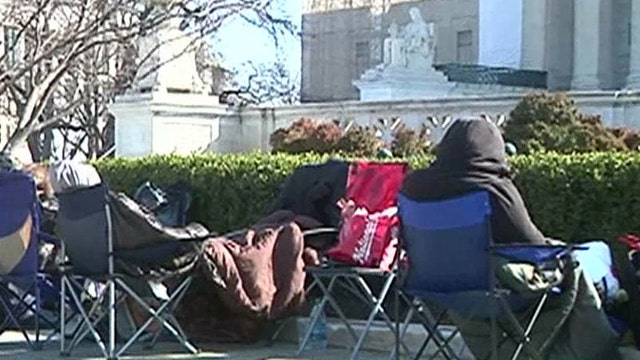The front-lines of the gay marriage debate move this week to the Supreme Court, as it considers two cases which have the potential to redefine marriage on a national level.
The arguments come at a time of changing views, with support for gay marriage becoming a mainstream Democratic position and the issue causing a sharp divide among Republicans.
The first case the court will take up, on Tuesday, is California's Proposition 8 ban on same-sex marriage. The court on Wednesday weighs the Defense of Marriage Act, considering a provision that defines marriage as between a man and a woman for the purpose of deciding who can receive a range of federal benefits.
It is the California case, though, that could have sweeping implications for the states. The judges could, if they choose to rule broadly, overturn every state constitutional provision and law banning same-sex marriages. Or, they could set back the gay marriage movement by upholding California's ban and continuing to leave the issue up to the states.
Signaling the widespread interest in the rulings, spectators have been lining up all weekend outside the court, camping out in Washington for a chance to hear the arguments. The issue has created fault lines within the Republican Party, as some prominent members drop their opposition to same-sex marriage while others stiffen it.
Gary Bauer, president of American Values, told "Fox News Sunday" that proponents of gay marriage are effectively asking "for unelected judges to deny the people of the states the right to decide what marriage is in their state."
Bauer said he would prefer that every state bar gay marriage. But, acknowledging that's not likely, he said the court should let the states decide. Bauer said people are only changing their minds on the issue "because there's been a full-court blitz ... by the popular culture, by elites and all kinds of folks to intimidate and to cower people into no longer defending marriage between a man and a woman."
But Nicolle Wallace, a former adviser to former President George W. Bush and to the 2008 McCain campaign, said those arguing against Prop 8 are in fact using a "conservative legal argument."
"They will basically lay out the conservative case that there is not any place in the Constitution that allows for a different set of rules for a different class of people," she told "Fox News Sunday."
"There's also a moral imperative here. If you believe, if you value and treasure and revere the institution of marriage, then you should want every family unit to be really wrapped in marriage."
[summary]
Top Democrats who previously opposed same-sex marriage -- and had taken the more moderate position of supporting civil unions -- have in recent months and years shifted course. President Obama announced his support for gay marriage in the months leading up to the presidential election. Hillary Clinton also recently followed suit.
But Republicans have also been crossing to the pro-gay marriage side. Wallace is among dozens of Republicans who filed a brief in the Supreme Court case arguing for Prop 8 to be overturned. One of the lead lawyers arguing against Prop 8, Ted Olson, also is a prominent conservative who was solicitor general under George W. Bush. And Sen. Rob Portman, R-Ohio, publicly reversed his position on the issue after his son came out as gay.
The position shifts, though, do not signal a party-wide change of heart. Many Republicans would still prefer the issue be left up to the states and are encouraging the high court justices to rule narrowly.
"They would be far better off to decide these two cases on the narrowest possible grounds," former House Speaker Newt Gingrich said Sunday. A sweeping decision against gay marriage, he said, would be a "huge mistake" that would "undermine respect for the judiciary."
Americans as a whole are likewise divided. A Fox News poll released Thursday showed 49 percent of voters favor legalizing gay marriage, while 46 percent oppose it. That marks a shift since the question was first asked in 2003 -- when 32 percent said gay marriage should be legal, and 58 percent opposed it.
Support for gay marriage has grown the most among Democrats, and self-described moderates and independents. Still, support for gay marriage rose by 10 points among Republicans over the past decade, according to the Fox News polling.
Gay marriage has been approved in nine states -- Connecticut, Iowa, Maine, Maryland, Massachusetts, New Hampshire, New York, Vermont, Washington -- and the District of Columbia.
But 31 states have amended their constitutions to prohibit same-sex marriage. North Carolina was the most recent example last May.
The case being considered Tuesday concerns the constitutional ban on gay marriage that California voters adopted in 2008. One key question before the court is whether the Constitution's guarantee of equal protection means that the right to marriage cannot be limited to heterosexuals.
The 9th Circuit Court of Appeals previously struck down Prop 8, without making any sweeping pronouncements. The larger constitutional issue almost certainly will be presented to the court, but the justices would not necessarily have to rule on it.
The other issue the high court will take on involves the central provision of the Defense of Marriage Act, which defines marriage as between a man and woman. Four federal district courts and two appeals courts struck down the provision.
Supreme Court rulings are expected in June.
The Associated Press contributed to this report.





